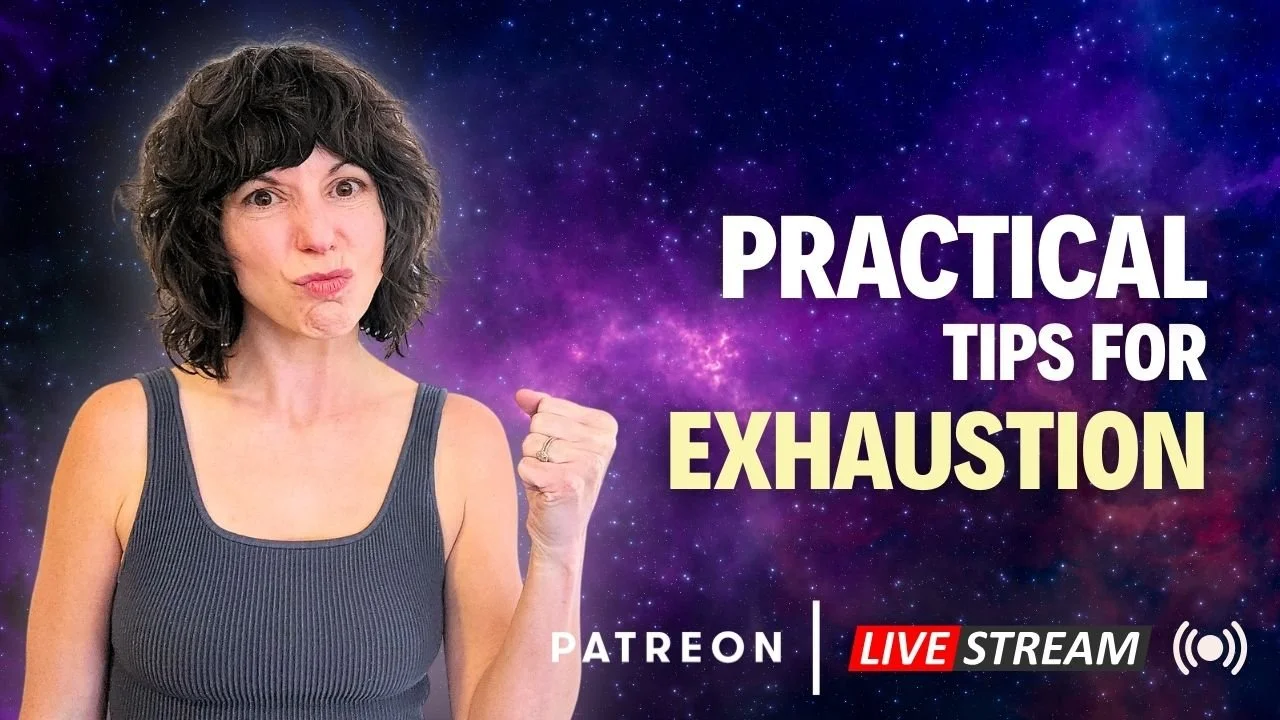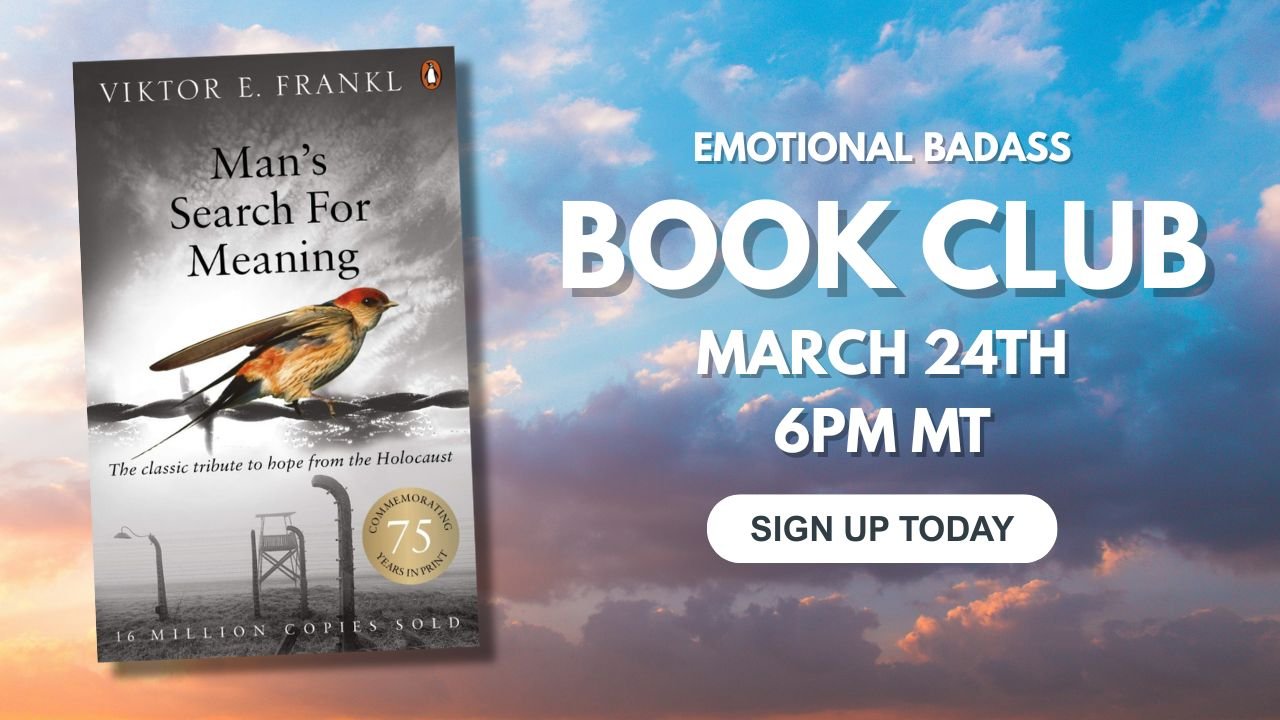What My Grandpa's WWII Survival Story Taught Me About Codependency and Resilience
Sometimes the most profound lessons about mental health come from the most unexpected places. For me, one of the deepest insights into codependency—and the heart-wrenching necessity of self-preservation—came from my grandfather's World War II survival story.
Looking Back to Move Forward
As highly sensitive people, we're often so focused on looking ahead that we forget to acknowledge how far we've come. We feel behind, expect too much of ourselves, and want to be further along than we are. This constant forward momentum, while admirable, can wear us out and rob us of satisfaction in our present moments.
Today, I want to invite you to pause with me. Take a breath. Let go of that voice that says "I should be over there by now" and instead ask yourself: What do I know now that I didn't know five years ago? Ten years ago?
This practice of positive reflection isn't just feel-good fluff—it's essential emotional strength training. We can't truly thrive if we're constantly chasing where we think we should be, because that desperation kicks our emotional system into survival mode instead of living mode.
The Grandfather Who Changed Everything
My grandfather was what I think of as the original highly sensitive person in my life. He was a gentle soul who cried when his beloved baseball players passed away, who grew cotton and peanuts in his backyard garden just to show us kids the wonder of how things grow. He built birdhouses and fought squirrels, creating a magical nature sanctuary right in the middle of the city.
But this tender, whimsical man also carried within him one of the most profound lessons about self-preservation I've ever encountered.
When the Ship Went Down
On April 20th, 1944, my grandfather was serving as a radio operator aboard the USS Lansdale in the Mediterranean Sea. As nightfall approached, German torpedoes struck the ship. Within twenty minutes—twenty minutes—the Lansdale had split in half and sunk.
Picture this: It's dark and smoky, the Germans are dropping flares to see their targets, and men are running everywhere, abandoning ship. My grandfather had to announce the captain's order to abandon ship over the radio, then make his own escape.
Every Navy man carried an uninflated inner tube as part of his uniform—a life preserver activated by pulling a cord. When my grandfather jumped into the water and pulled his cord, it ripped. The device didn't inflate.
Of course, he would laugh when telling this story. Murphy's Law.
The Choice That Changed Everything
Through the smoke and darkness, a rescue dinghy approached. The man inside shook his head—they were full. But seeing my grandfather's broken life preserver, this stranger gave him his own, saving my grandfather's life before floating away into the night.
Now came the moment that would teach me everything I needed to know about codependency.
Men were scattered across the dark water. The natural human instinct? Group up. Swim toward each other. Strength in numbers. But as my grandfather approached other survivors, he noticed something: There were injuries, blood in the water, and sharks were coming.
In that moment of terror, with every instinct screaming at him to latch onto others for comfort and safety, my grandfather made an impossible choice. His high sensitivity and intuition told him something crucial: To survive, he had to float alone.
He watched other men climb on each other in panic, accidentally drowning one another, their thrashing only attracting more sharks. And he swam away from them. Away from the human connection his body and mind desperately craved.
He chose self-preservation over the instinct to latch on.
The Codependency Connection
This story began shaping my understanding of codependency long before I knew what that word meant. For highly sensitive people, "codependent" can feel like an insulting label—we see ourselves as fiercely independent in spirit and mind. But here's the truth we need to hold:
Codependency isn't about being weak. It's about that moment when we know, deep down, that the wisest thing we can do is let go—but every fiber of our being wants to latch on instead.
Your Sinking Ships
You probably won't find yourself floating in a war-torn sea anytime soon. But we all face these heart-wrenching decisions:
The job that's sucking the life out of you, but feels safe and familiar
The relationship that's run its course, but letting go feels impossible
The memory of someone you've lost that's blocking you from moving forward
The caretaking patterns that sacrifice your dreams for others' comfort
The habits that numb you—too much wine, endless scrolling, video game escapes
In each of these scenarios, there's that uncomfortable space we don't want to be in. Part of us wants to latch on, to keep things as they are. Another part knows we need to let go and swim toward our own survival.
That uncomfortable space? That's where we grow.
The Permission to Self-Preserve
If my grandfather could make that impossible choice while floating alone in shark-infested waters, perhaps we can make our own necessary choices today. This week. In the smaller but no less important battles we face daily.
Self-preservation isn't selfish—it's survival. And we can't help anyone else if we're drowning.
Sometimes the most loving thing we can do, for ourselves and others, is to stop trying to rescue everyone around us and instead swim toward our own life preserver.
The Practice of Letting Go
Here's what I've learned from years of working with people on codependency issues: Life gets easier and lighter when we give ourselves permission to do what we need, even when it's heart-wrenching.
This doesn't mean becoming cold or uncaring. It means recognizing that our instinct to latch on—to fix, to save, to carry others' emotions—sometimes puts everyone at greater risk.
The practice is daily: In small moments and big decisions, asking yourself, "What does my survival require right now? What would self-preservation look like in this situation?"
Honoring the Struggle
As I listen back to this old episode, I can hear the nervousness in my voice—the loyalty and tenderness I still felt toward my grandfather's memory, wondering if sharing his story was the right choice. That's growth too, recognizing that none of our choices are perfect or pure.
We do the best we can with the wisdom we have, and we honor both our struggle and our progress.
Your journey toward healthier boundaries and less codependent patterns deserves the same honor. Every small choice to prioritize your wellbeing, every moment you resist the urge to latch on when letting go serves everyone better—these are acts of courage.
Moving Forward
Take a moment today to celebrate how far you've come. Notice what you've overcome, inside yourself and in the world around you. This isn't just positive thinking—it's recognizing your strength, respecting your struggle, and honoring your wins.
Because if you're drawn to stories like this, if these words resonate in your highly sensitive soul, then you're already doing the hard work of growth. You're already learning to navigate that space between latching on and letting go.
And that, more than anything else, gives me hope for all of us learning to swim toward our own survival, one courageous choice at a time.
What sinking ship in your life might be calling you to swim toward your own life preserver? Sometimes the most loving thing we can do is save ourselves first.
Episode Tags
- ADD 1
- Abuse 17
- Alcohol 3
- Anger 11
- Archetypes 1
- Bullying 6
- Childhood 37
- Codependency 10
- Covid 4
- Crystal Catalina 4
- Depression 15
- Detachment 2
- Disassociation 4
- Emotions 75
- Existentialism 2
- Faith 1
- Family 28
- Fatigue 4
- Focus 3
- Gratitude 11
- Grief 14
- Guilt 2
- Healers 7
- Healing 52
- High Sensation 4
- Hope 1
- Hypervigilance 7
- Introverts 6
- Lonliness 9
- Love 3
- Manifesting 5
- Manipulation 20
- Masculinity 1
- Men 1
- Mindfulness 39
- Money 10
- Music 3
- Nutrition 2
- Overthinking 8
- PTSD 13
- Parenting 12
- People Pleasing 9
- Perfectionism 6
- Pets 4
- Relationships 21
- Resiliency 14
- Sadness 1
- Self Esteem 19
- Self Love 11
- Self Respect 1
Upcoming Events
Episode Tags
- ADD 1
- Abuse 17
- Alcohol 3
- Anger 11
- Archetypes 1
- Bullying 6
- Childhood 37
- Codependency 10
- Covid 4
- Crystal Catalina 4
- Depression 15
- Detachment 2
- Disassociation 4
- Emotions 75
- Existentialism 2
- Faith 1
- Family 28
- Fatigue 4
- Focus 3
- Gratitude 11
- Grief 14
- Guilt 2
- Healers 7
- Healing 52
- High Sensation 4
- Hope 1
- Hypervigilance 7
- Introverts 6
- Lonliness 9
- Love 3
- Manifesting 5
- Manipulation 20
- Masculinity 1
- Men 1
- Mindfulness 39
- Money 10
- Music 3
- Nutrition 2
- Overthinking 8
- PTSD 13
- Parenting 12
- People Pleasing 9
- Perfectionism 6
- Pets 4
- Relationships 21
- Resiliency 14
- Sadness 1
- Self Esteem 19
- Self Love 11
- Self Respect 1




















